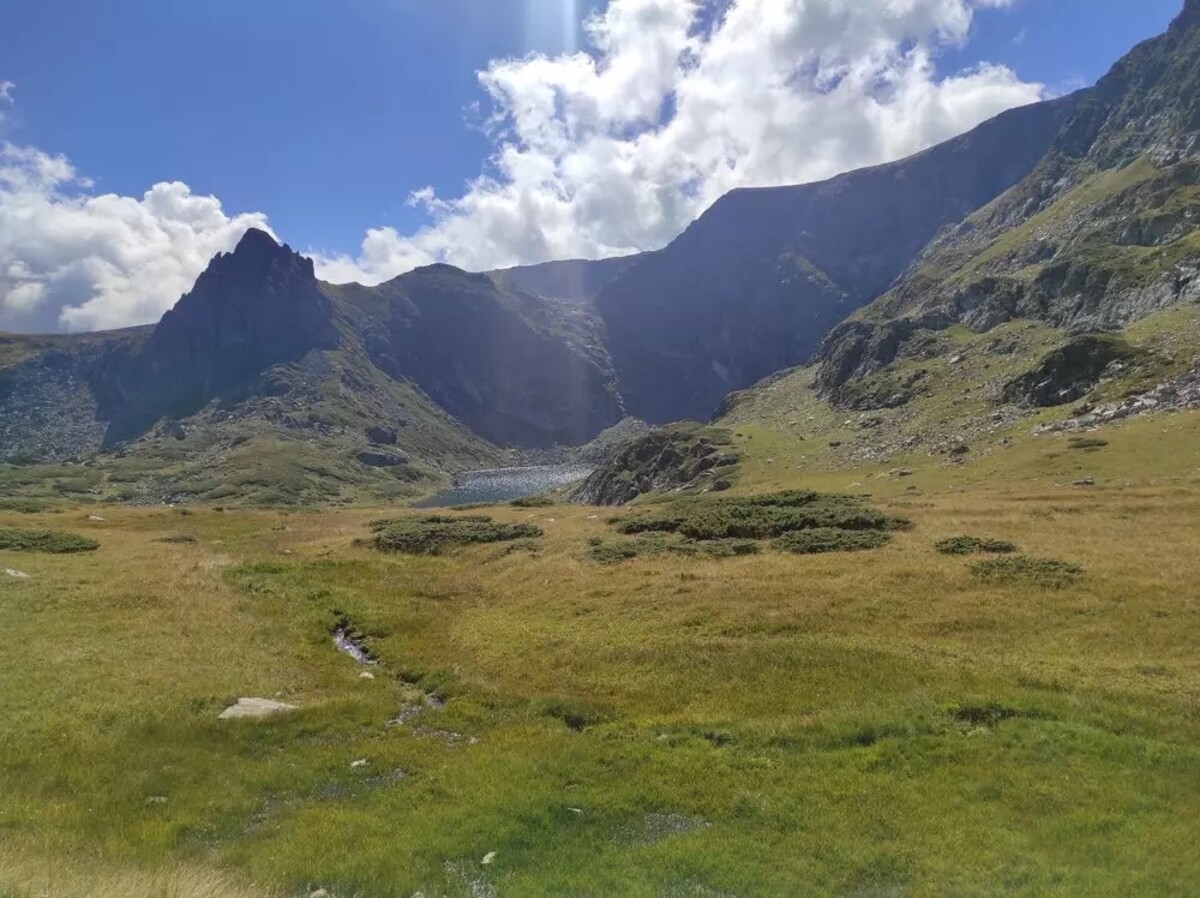Everywhere we felt like welcomed guests. I mean... almost everywhere.
Just a short hop from Sofia, Bulgaria, we reached the mountains, from which radiates the atmosphere of the Middle Earth. In the center of the capital, we enjoyed the great local cuisine, had fun watching people dancing in the rain, and visited the local mosque. However, our impressions of the trip were slightly spoiled by a visit to the Russian embassy, where they are clearly not too fond of tourists.
"Can I help you with something?"
The Embassy of the Russian Federation in Sofia, the capital of Bulgaria, resembles a small fortress. Rows of high bars are erected along the long walled building, through which, in some parts, you can't even see well into the spacious area.
In the capitals of the Baltic states, Russian embassies were surrounded by hundreds of different banners against Russian aggression, so we wondered whether there would also be references to support Ukraine at the embassy in Bulgaria.
After all, Bulgaria at one time fell under the sphere of the Eastern Bloc, so the people there could still remember the grievances of the recent past and support the country defending its territory all the more. This is evidenced by the street near the embassy, which was renamed Heroes of Ukraine this year.

As we reach the main entrance, we finally get a better view of the embassy. We start taking pictures of the embassy and its surroundings, we attract the attention of a guard who looks at us as if we are planning to carry out some malicious activity. But at first we don't pay too much attention to him, because we are preoccupied with observing a small photograph surrounded by dried flowers and a few candles.
In the frame we see the smiling face of the late Daria Dugin, the daughter of the Russian fascist Alexander Dugin, who died as a result of a car explosion. Russian partisans (National Republican Army) claimed responsibility for this act, but Dugin blamed the "Ukrainian Nazi regime" for his daughter's death.
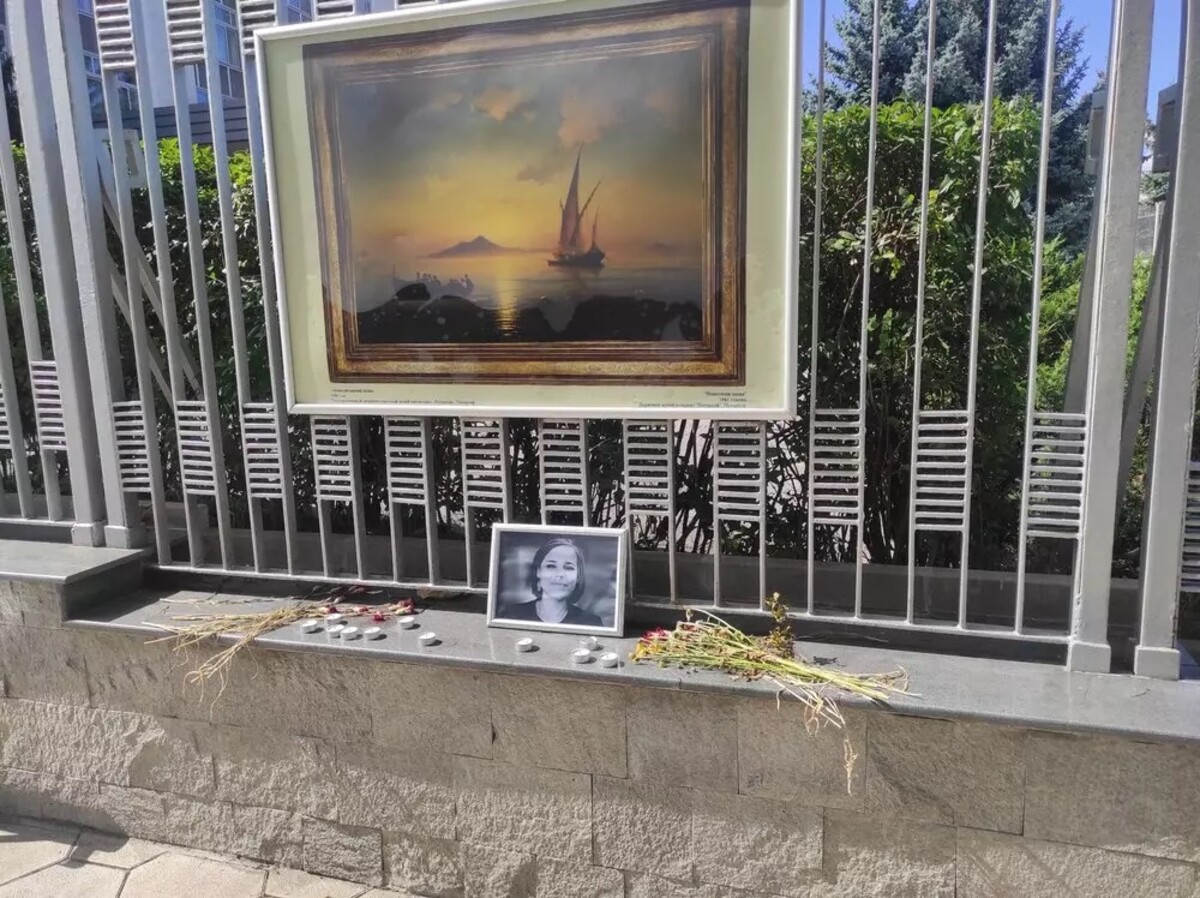
We are pulled out of our thoughts by the sight of the guard, who is standing just a few steps behind us and has obviously been following us the whole time as we walk along the wall. At first we think we are just being paranoid, but then suddenly he takes the initiative to approach us. "Can I help you with something?" he asks suspiciously in a foreign language.
We can't tell if he's speaking Russian or Bulgarian, given the similarity of the languages. We answer him in English, he does not continue the dialogue and walks away. Not long after that, an elderly woman and a man, apparently embassy workers, come out of the building. Even their observation of our walk by the embassy does not seem very friendly.
When we pass the vicinity of the embassy, we go around the corner to Hrdinovia Ukrainy street, where we sit down on a bench to rest for a moment and have a drink. Among the bushes on the corner, we again observe the guard, who symbolically sends us away with a grumpy look. We feel like waving at him, but in the end we refrain from this provocation and leave, heading towards the city centre.
Traditional Bulgarian dance in the rain
We quickly forgot about the treatment at the embassy and started enjoying the entertainment in the city, which was present really everywhere - even at the church. In front of one of them, we got into a crowd of tourists, who were amused to film the newlyweds going out into the street, where a band was already waiting for them. The sight of the bride, groom and dozens of other guests dancing in front of the church was truly humorous. Dancing in the streets was not unique.
Behind the mosque in the center of the city, we came across a group of people playing music from a speaker and dancing hand in hand together. Young and old, women and men. It didn't bother anyone in the least that it had been raining for a few hours. Some put on raincoats, others didn't mind the minor shower of raindrops at all.
"It's a horo, our traditional dance. In Bulgaria, you will practically not find a person who does not master at least basic horo dances," explained Amina (29), who graduated from university in Sofia.
Treacherous alcohol ordering
During the weekend, Sofia is really lively. The center is crowded with people walking around the city, and on the main streets it would be difficult to find a seat in the better restaurants without a reservation. So we went a short distance from the centre to a very well-rated establishment with a lot of local specialties called Raketa Rakia.
When choosing meals, we got advice from the waiter, who offered us a three-course dinner full of Bulgarian dishes. As an appetiser, they brought us toasts with various kinds of very tasty spreads with a vegetable side dish and grated Bulgarian cheese.
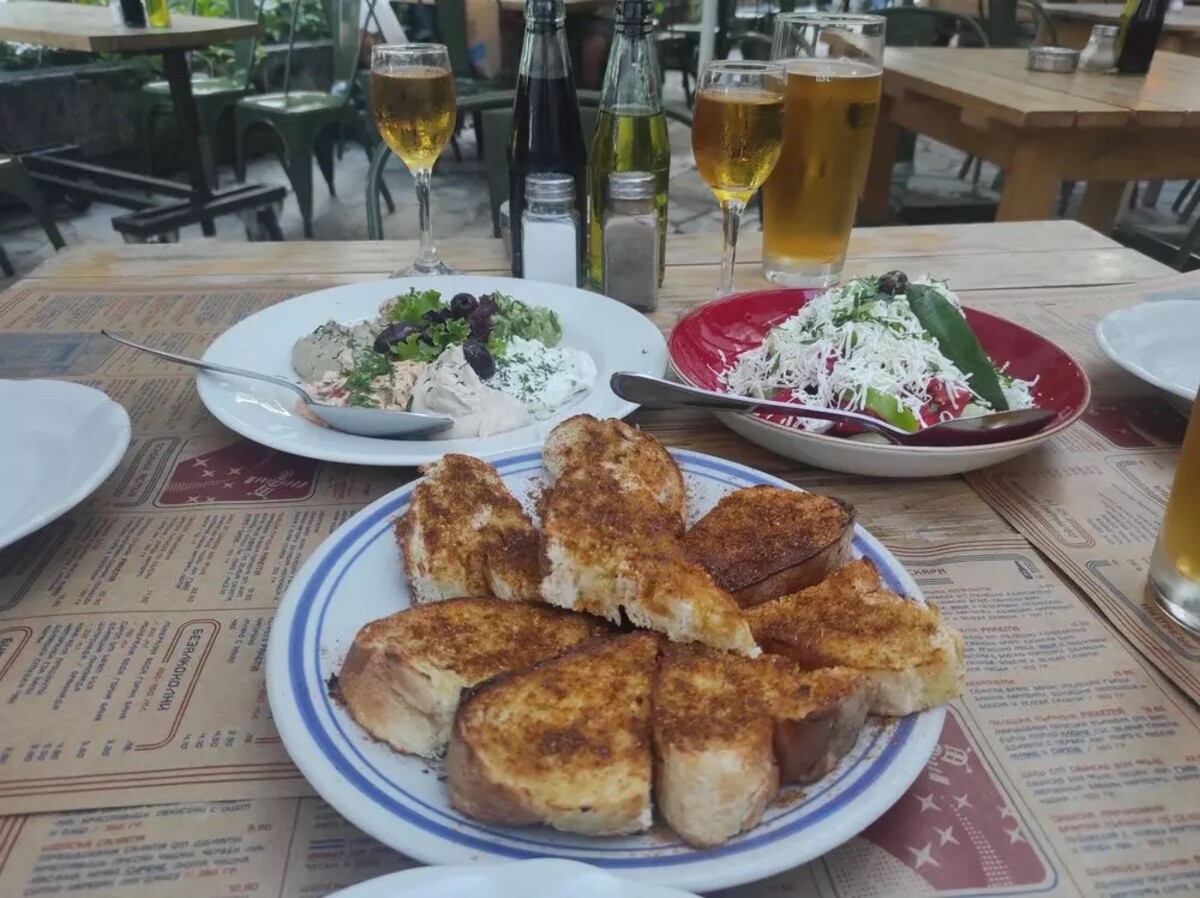
Our taste buds were also pleased with the rakija produced specially within the company. When asked whether they should pour us a small or a large one, we, of course, declared that we would dare to have a larger glass as well. We thought at the time that we were deciding between a volume of 0.02 and 0.04 l, but to our surprise, the attendant poured us full decilitre. Well, we had no choice but to complete this challenge.
The second course consisted of cheese boiled in a pan with honey glaze, which created a thin crispy crust on the surface of the cheese. The contrast of saltiness and sweet honey completely blew us away. In the final round, the waiter brought us a large plate overflowing with three types of meat, after which we had to succumb to rest.
Despite this, one of the waiters was able to convince us for the final dessert, which they say was mainly made in Bulgaria during the times of socialism. And we didn't regret it. The soft dough combined with the delicious jam worked really well for us.
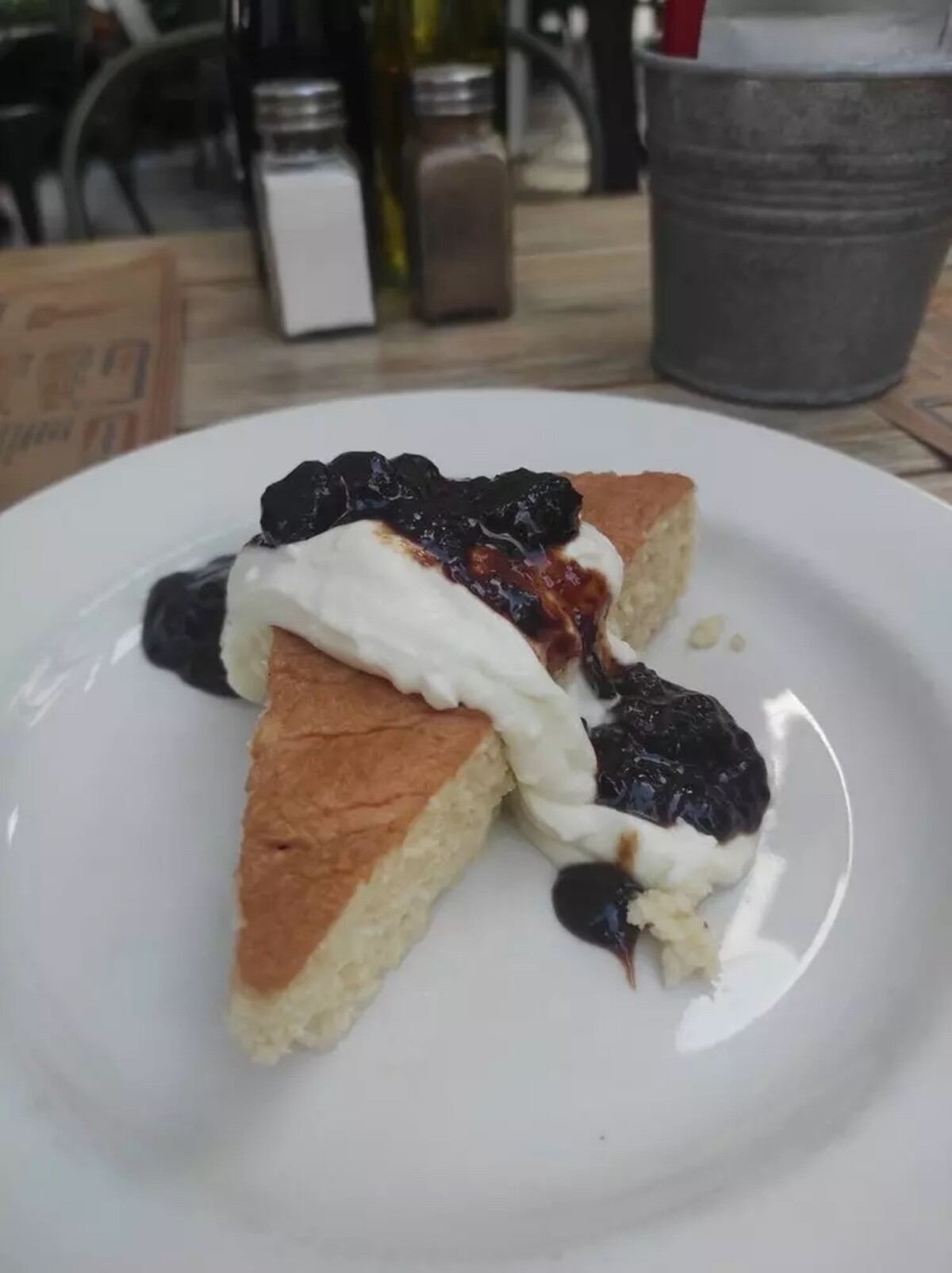
They described every dish to the last detail while serving it and kept asking how we liked it, which made us feel really comfortable. The service in the restaurant was simply above standard as well as the excellent cuisine. If you ever visit Sofia, be sure to stop by there. But be careful not to shake your head from side to side when asked if you want to have another round of alcohol. In Bulgaria, it is an expression of consent. It could easily happen that they bring another round to your table.
A mosque just a hop away from a Jewish synagogue
Freedom of religion is one of the important elements in democratic states. Countries such as Bulgaria, which have experienced oppression in this area as well, should strive all the more to ensure that believers do not feel discriminated against in any way.
Although Eastern Orthodox Christianity predominates in Bulgaria, minority faiths such as Muslims (10%) and Jews (along with other minorities below 0.2%) are also represented in Sofia, which is reflected in the presence of their sanctuaries in the capital.
The Banya Bashi Mosque, located in the center of Sofia, has been standing there since the 16th century. Together with the minaret, it reaches a height of 15 meters. Compared to the famous Hagia Sophia in Istanbul with a height of 55 meters, it is really modest, but no less impressive.
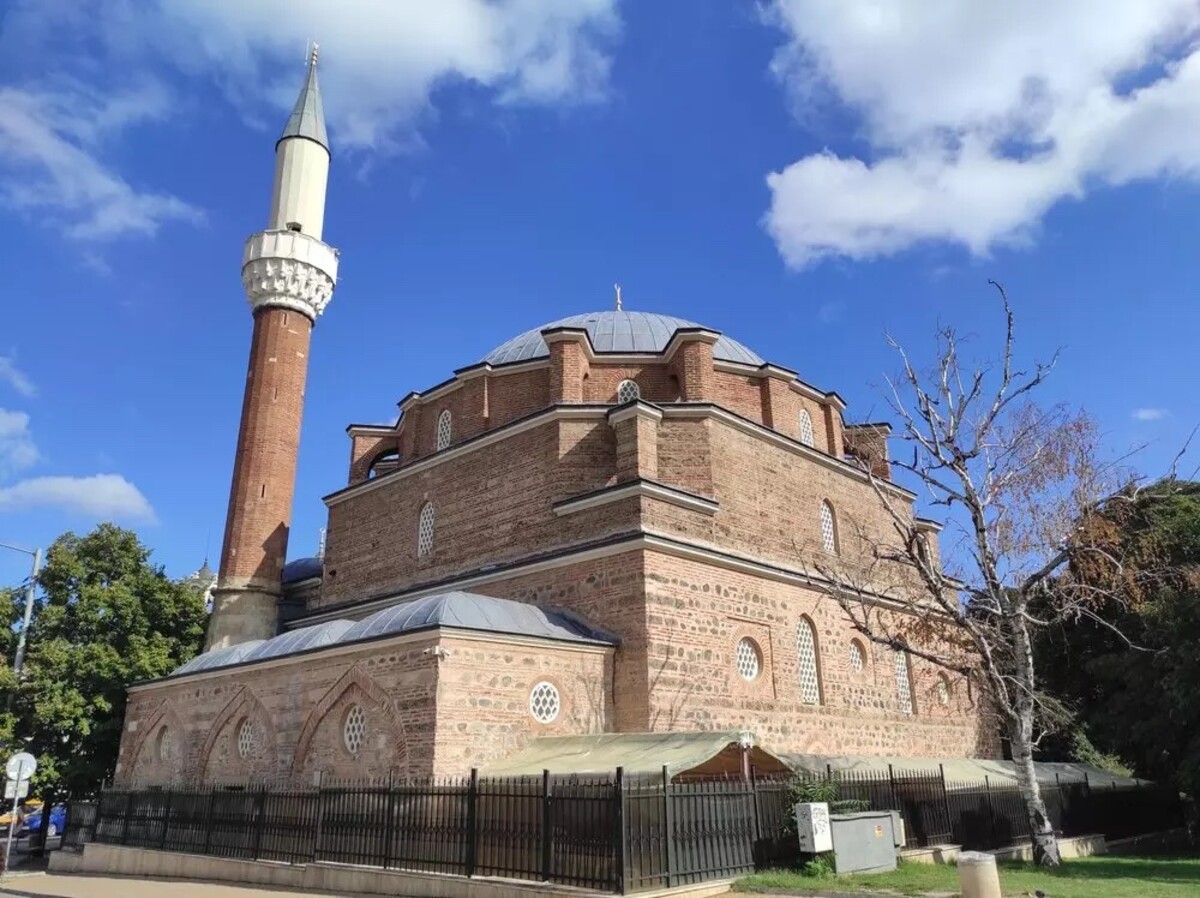
We arrive at the mosque in the morning on weekends. To the left, a woman is sitting on the lawn, covered entirely in black so that her face cannot be seen. She seems to be praying. However, the entrance to the mosque area is closed - there is a chain and locks hanging on the gate.
When a local Muslim sees us staring blankly at the closed gate, he explains to us that we should wait. There is currently a prayer going on inside and we will be able to enter in five minutes. A man sitting at the entrance makes sure that visitors to the mosque take off their shoes and that women wear headscarves.
The main prayer room is highlighted by a large colorful carpet and a striking chandelier. The room is divided into two parts - men pray in one, women in the other. The tourists who entered with us were particularly interested in the Muslim clock showing the five times for prayers. On the right side we reached a room with Islamic literature. Unfortunately, we did not find any in English in our selection of books.
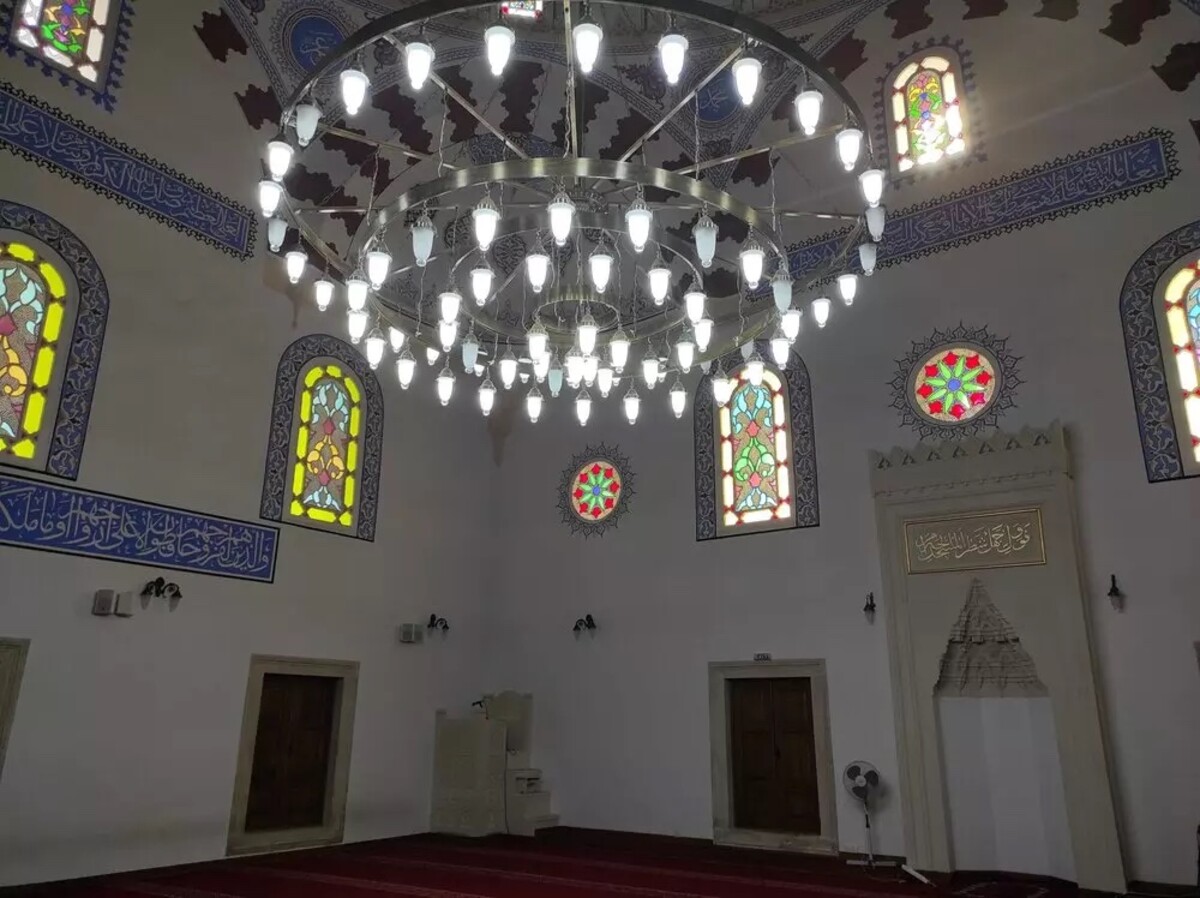
From the mosque, we move towards the Jewish synagogue, which is only a few hundred meters away. According to the rules posted at the gate of the building, in Sofia, the synagogue rules are much stricter than in the mosque.
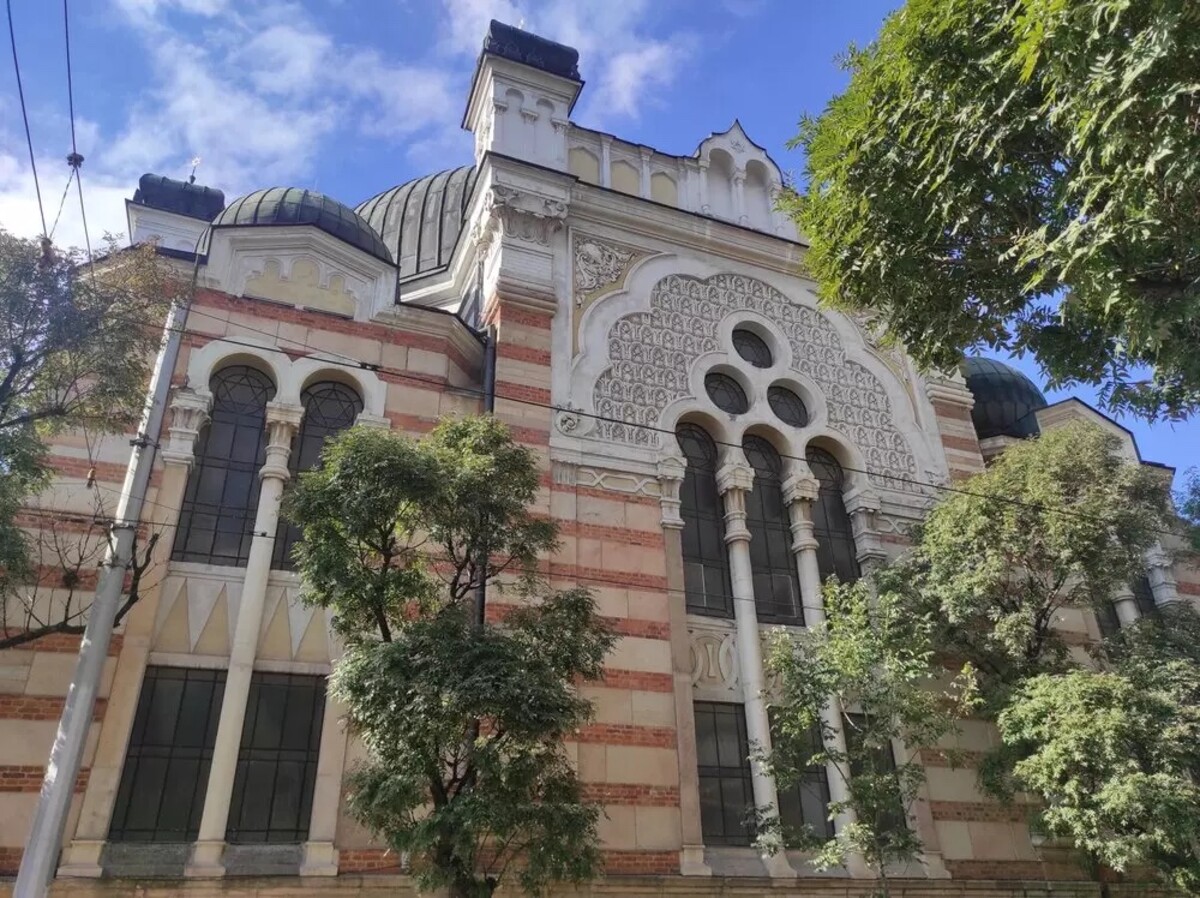
Prohibited clothing includes sleeveless shirts, shorts or sandals. Furthermore, entry is allowed only with luggage of a certain type and size, which must be additionally searched by security. However, even if the applicant meets all the requirements, the security service employee has the right not to let him in, without giving any reason. However, at the time of our arrival, access to the area for visitors was prohibited, so we did not go through the control process.
Although the gates of the synagogue were closed to us, we were able to visit several Orthodox churches in Sofia. They were really pompous compared to our usual Catholic churches. We could only take photos from the outside of some, while others allowed us to take pictures from the interior as well.
We waited for Frodo to run by us with the ring
It is approximately 6 o'clock in the morning. Stray dogs on the streets, huddled in the corners of buildings, sleep undisturbed even when we walk right past them.
On the last day, we set off in a group with a guide to the great pride of Bulgaria - the seven Rila lakes, which are located at an altitude of 2,100 to 2,500 meters above sea level. By comparison, Bulgaria's highest peak, Musala, is 2,925 meters above sea level.
After about an hour and a half long drive, we get off at an elevated parking lot. According to the guide, we could make the journey to the lakes on foot in a few hours, but we are pressed for time. That's why, like the other members of the group, we use the opportunity to go up by cable car. However, no regrets, the view from it is really beautiful.
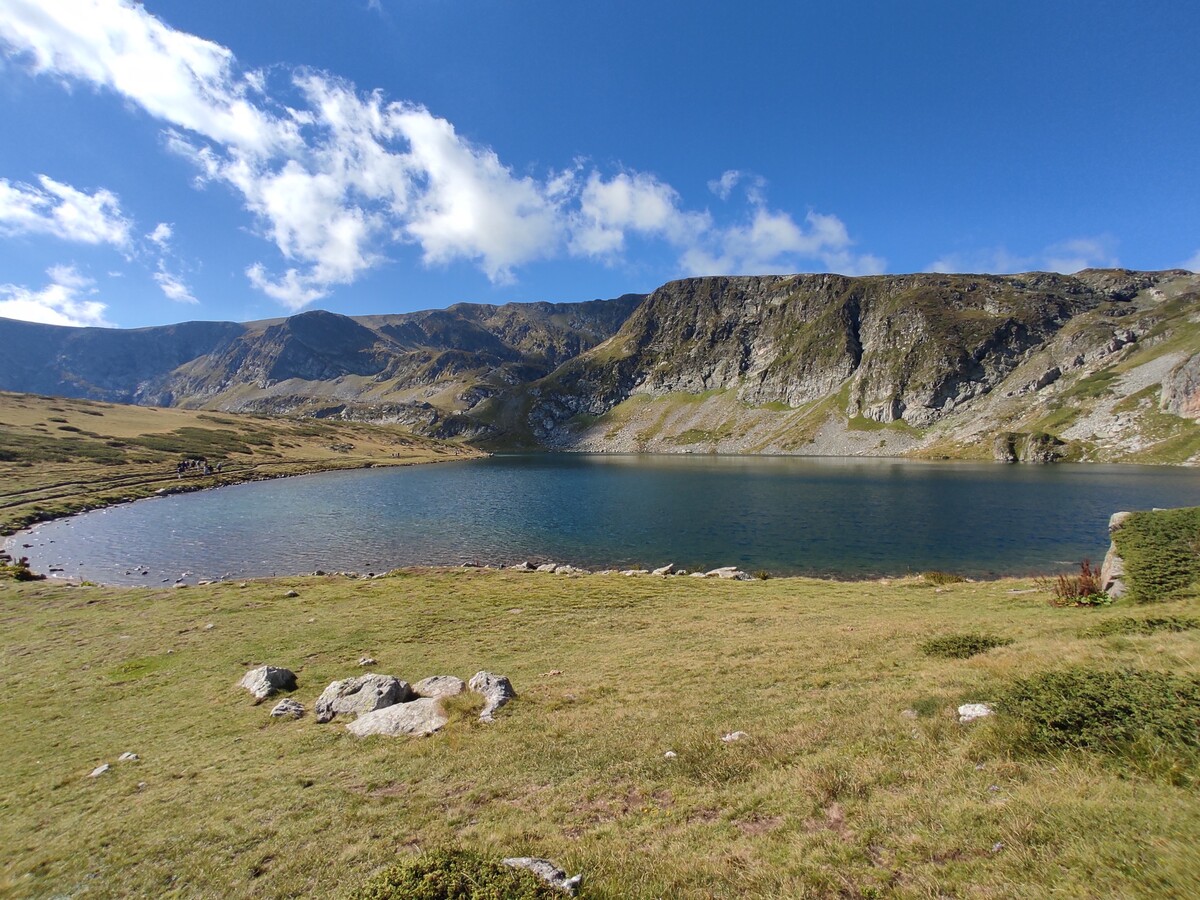
One part of the group then leaves together with the guide, and we go on alone. There is a long, circular road leading to all seven lakes, on which you simply cannot get lost (at least that's what we thought at first).
The steep climb up the hill is not exactly easy. We have to stop a few times to catch our breath, drink water and take off our sweatshirts. At an altitude of more than 2,000 meters above sea level, it is colder than in the lowlands, but one can easily warm up while walking and basking in the mountain sun. We can't help but look around, some parts of the route remind us of the spectacular scenery of New Zealand as from Lord of the Rings.
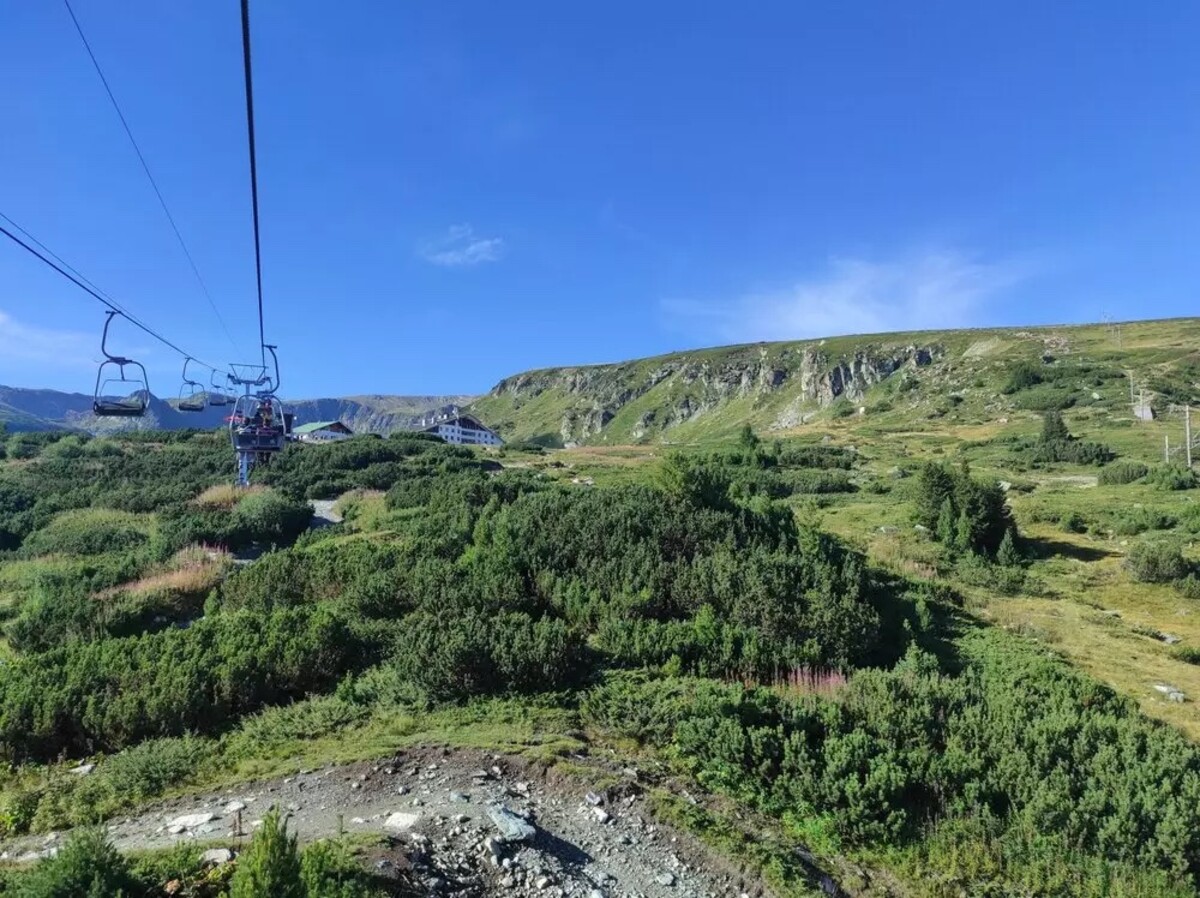
After climbing to a height of almost 2,300 meters above sea level, we spot the first lakes from above. We will get close to them later. We walk straight for about another hour and reach the first lake called Babreka. We sit down, eat our food and enjoy the wonderful view of the crystal clear water.
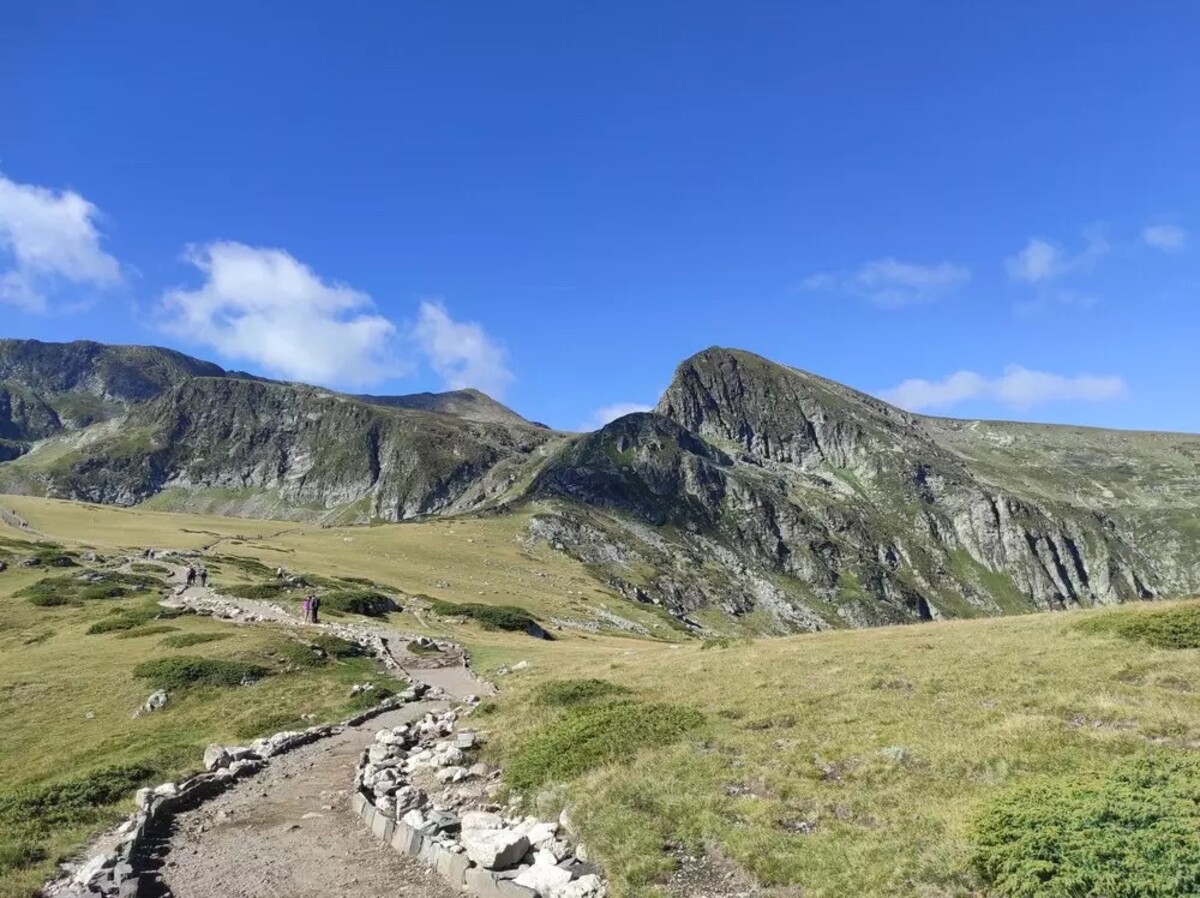
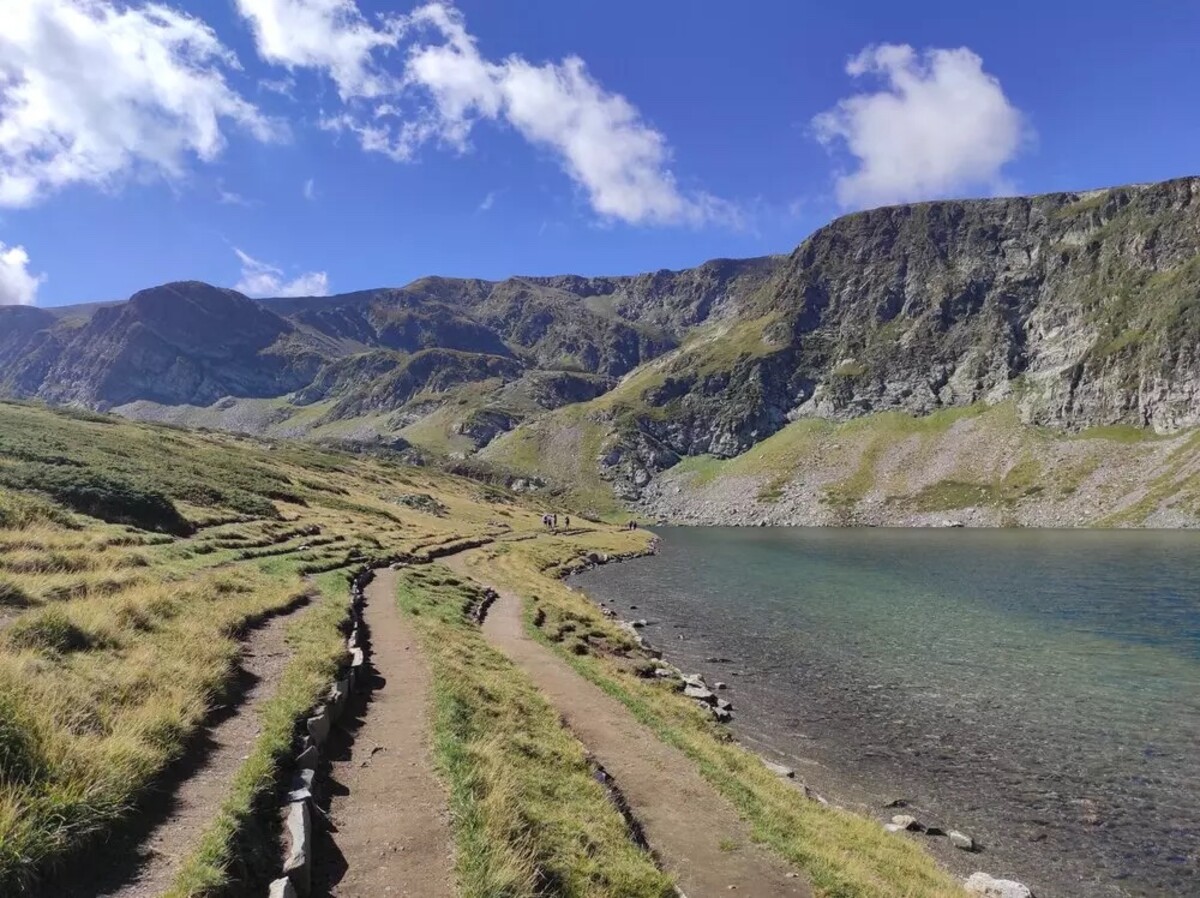
In order to keep the nature clean, the basic rule must be followed - no soaking in the water. While we eat our snacks, the silence of the gentle breeze is broken only by the whistle of the inspector who makes sure that people follow this rule. However, since many do not pay attention to it, the sound of the whistle annoys us approximately every five minutes.
A few hundred meters behind Lake Babreka, we see another "stepping stone", which, according to the map, would lead us to Lakes Okoto and Szalta at an altitude of about 2,500 meters above sea level. However, since we have to stick to the group's time regime in order to get back to the parking lot in time, we skip the pair of elevated lakes.
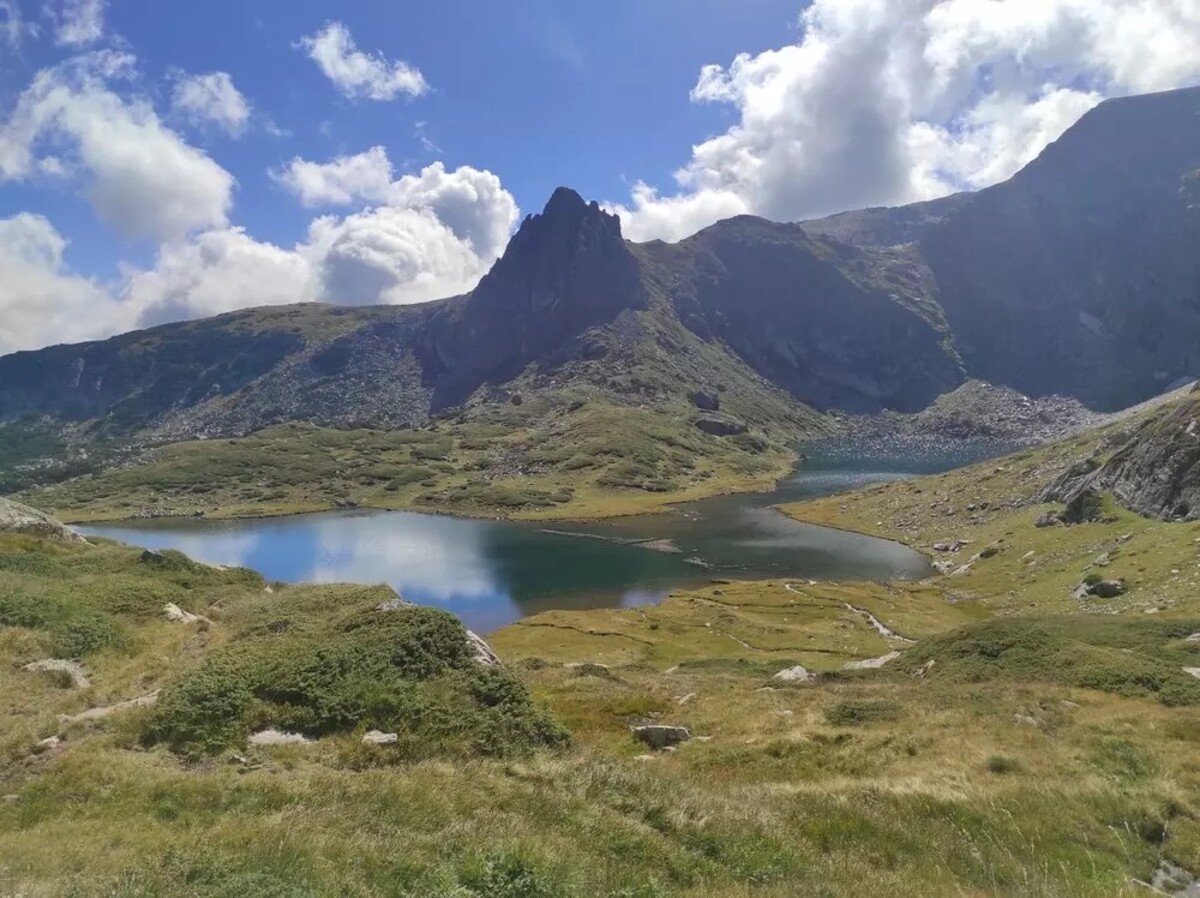
However, even the lower-set lakes are breathtaking. Bliznaka, Trilistnika, Ribnoto and Dolnoto differ in their shape and size, and we had a reason to stop by each of them. At one of the last lakes, however, we are not sure where to turn. Time pressure, unfortunately, forces us not to linger for too long. On the spot, a moment later, we meet a couple of Spanish tourists who have the same problem.

Finally, we manage to find a tourist sign and together we continue towards the center and find the cable car. Our fast pace of walking is in imaginary harmony with the very fast debate in Spanish, and thus we form a peculiar but quite compatible team. After arriving at the center, we find that it has quite a bit of time to spare.
We are therefore a bit sad for not attempting to hike up to the highest-set lakes Okoto and Szalta. However, the remorse passes us very quickly when we look at the stand serving beer. While the group with the guide catches up with us, we manage to admire the mighty mountain range that surrounds the extraordinary seven Rila lakes with refreshments in hand.
